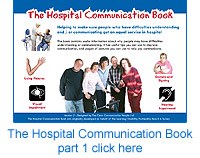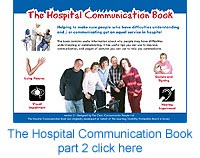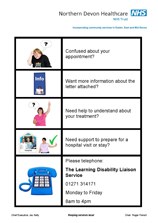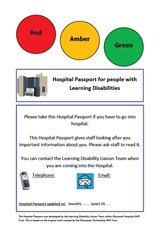Information for carers & support workers
Important documents
Definition of a Learning Disability
Adults will be considered to have a Learning Disability if there is :
- a significantly reduced ability to understand new or complex information, to learn new skills (impaired intelligence), with;
- a reduced ability to cope independently (impaired social functioning);
- which started before adulthood, with a lasting effect on development.
(Valuing People, the 2001 White Paper)
About people with a Learning Disability
People with a learning disability need special consideration to ensure that they receive care and treatment which meets their specific needs and maintains their safety.
Frequently people with a learning disability will have a number of complex needs which may include impairments in functional skills, communication and additional sensory impairments.
Individuals with multiple disabilities and complex health problems are more likely to use health services (including acute hospital services) on a regular and frequent basis (The National Patient Safety Agency 2004)
People with a Learning Disability will be less able to understand and retain new or complex information.
They will need you to use simple language, and explain things that may be unfamiliar using various communication aids.
They may be at greater risk of swallowing difficulties
They may be less able to communicate if they are in pain or discomfort.
May rely on others to meet some or all of their basic needs or to maintain their safety
(Department of Health 2001)
Patients Who Do Not Attend a First Outpatient Appointment
The 18 week clock rules states that if a patient DNAs their first appointment, including straight to test, after initial referral, they will have their clock nullified and the referral returned to the GP/GDP as long as the Trust can demonstrate that the appointment offer was clearly communicated to and received by the patient. A new clock starts on the date a subsequent referral is received.
The DNA Reminder Service reminds patients of future appointments, seven days in advance, and Contacting the Acute Learning Disability Liaison Service with a copy of the patient’s details. This provides them with the opportunity to change or cancel their appointment before it becomes a DNA.
The 18 Week rules for DNAs do not differentiate between adults and children. However, consideration should be given to allocating a second appointment, before discharging children, vulnerable adults, in cases of clinical urgency, i.e. two week wait patients or others as clinically indicated. In this instance, the RTT clock will be reset to the date of the DNA. Providers need to ensure this is reflected in the Safeguarding of Children and Safeguarding of Adults
The role of the Learning Disability Liaison Nurse
- To support the patient and their supporters and/or family carers to have a positive experience of care within the hospital.
- To identify what reasonable adjustments are required by the individual and support the provision of these adjustments.
- To ensure that NDHT are providing safe and equitable access and treatment for people with learning disabilities.
- To assist North Devon District Hospital to adjust the patient pathway appropriately, liaising and arranging across professional boundaries to ensure complex health needs are met for patients.
- Contribute to ensuring healthcare is led by the appropriate clinical professional to meet the identified clinical needs in co-ordination with the appropriate clinical teams and allied health professionals.
- Support healthcare professionals to recognise that the person’s Learning Disability is not a clinical need, but may impact on how the clinical needs can be understood and best managed.
- Advise and assist the hospital in providing accessible information for people with learning disabilities.
- Raise awareness of the dangers of ‘diagnostic overshadowing’;( a term used to describe a diagnoses of a medical problem being overshadowed by the person’s disability )
- Support individuals with Learning Disability, their family and carers to ensure that their voice is listened to within the hospital, in clinical decision making, in providing care and other situations that arise.
- Encourage a cultural change of respect of the person’s abilities and rights.
Nurse Liaison for adults with a Learning Disability
Please contact Lisa for any advice, support or education
01271 314 171, Bleep 382 or email: lisabaker@nhs.net
Forms and Documentation
The Hospital Communication Book is a useful tool for use with anyone who has difficulties with communication.
The Hospital Communication Book part 1 
The Hospital Communication Book part 2 
Easy Read outpatient appointment letter 
Recognising learning disabilities (pdf)
Mental Capacity Assessment form (word doc)
IMCA checklist (pdf)
IMCA Referral form (word doc)
Learning Disability, Poor Vision and Registered Blind PAS prompts (pdf)
Website links
Patient information leaflets in easy read format
- Anaesthetic (easy read)
- Aphasia – Aphasia friendly
- Before my appointment in Audiology (easy read)
- Cardio Pulmonary Resuscitation (CPR) and DNACPR (easy read)
- Coming into hospital (easy read)
- Comment card (easy read)
- Complaints (easy read)
- Consent (easy read)
- Dental general anaesthetic (easy read)
- DoLS (Deprivation of Liberty Safeguards) (easy read)
- Eating and Drinking Accepting Risk – Aphasia friendly
- Fasting before operation (easy read)
- Going into Day Surgery (easy read)
- Having a hearing aid fitted (easy read)
- Having an impression taken for an ear mould (easy read)
- Having your balance tested (easy read)
- Having your hearing tested (easy read)
- Hospital ‘photo passport’ (easy read)
- My daycase operation – dental (easy read)
- PALS and making a comment (easy read)
- SALT Adult Learning Disability Service (easy read)
- Swallowing difficulties (dysphagia) – Aphasia friendly
- Tympanometry – other test at the Audiology clinic (easy read)
- Videofluoroscopy (easy read)

